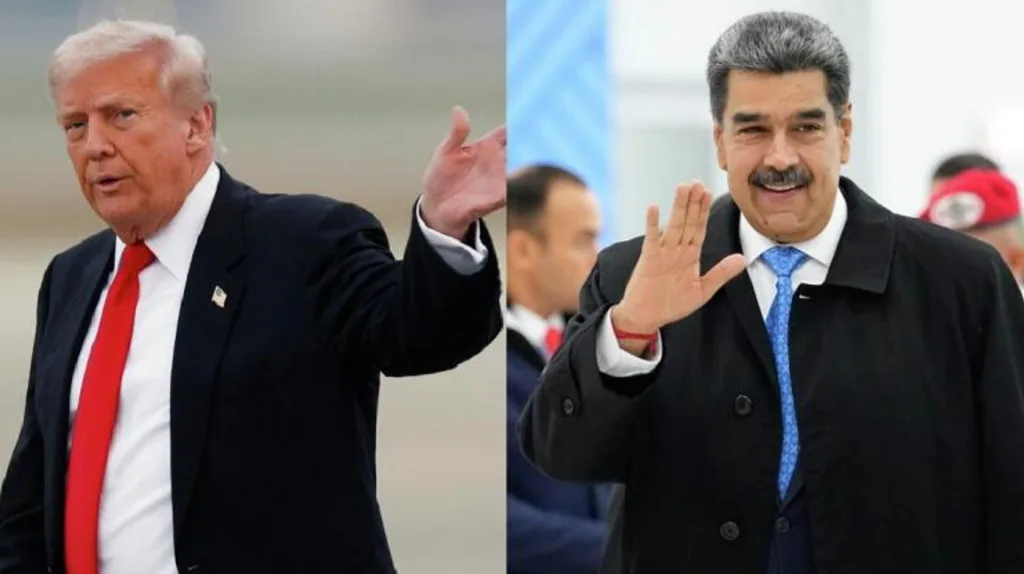
US President Donald Trump (left) and Venezuelan President Nicolás Maduro (right). Photo: AP.

Orinoco Tribune – News and opinion pieces about Venezuela and beyond
From Venezuela and made by Venezuelan Chavistas

US President Donald Trump (left) and Venezuelan President Nicolás Maduro (right). Photo: AP.
During the broadcast of his program Con Maduro+, the president of Venezuela, Nicolás Maduro, reiterated his desire to dialogue with his US counterpart, Donald Trump, amid Washington’s growing military escalation in the Caribbean.
“Whoever wants to talk to Venezuela, we will talk face to face,” the president declared.
He also reflected that political lobbies in Washington want “President Trump to make the biggest mistake of his life and take military action against [the South American country], which would be the political end of his leadership and his name.”
His response comes in the wake of statements by Trump, who recently opened the door to an unprecedented rapprochement—a stance the US president reiterated on Nov. 18.
“He wants to talk to me and I’m willing to talk to him … but we were treated very badly,” Trump said at a White House press conference.
The exchange places on the global agenda the tangible possibility of a meeting that would mark a turning point in continental geopolitics.
A shift imposed by the less radical wing?
The US president’s words—which contrast with the usual rhetoric of the Republican Party—were analyzed by Venezuelan political scientist Gabriel García in an interview with Sputnik.
“President Donald Trump’s recent statements about a possible rapprochement, a dialogue with President Nicolás Maduro, are a demonstration of that fragile line, or narrative, that exists internally [in the US],” the analyst noted.
For García, this apparent contradiction within the US power structure is symptomatic.
“Hours before Trump’s comments became public, Secretary of State Marco Rubio announced plans to designate the Cartel of the Suns as a terrorist organization—a strategy to justify increased counterterrorism funding and bypass the need for congressional approval of a military intervention, which has not been achieved previously,” he explained.
García said this potential opening reflects the agenda of the Republican Party’s less radical faction, personified by figures like Richard Grenell, which may be gaining influence.
“Domestically, the Republican administration isn’t having an easy time,” he stated. “As usual, the United States is trying to distract from internal problems by launching foreign conflicts and appealing to patriotic fervor.”
However, domestic and regional pressures now appear to be pushing in the opposite direction. “The victory of a socialist and Muslim in New York [Zohran Mamdani] … signals a shift in US politics that is forcing Trump’s party to rethink its approach. They may now be considering a less radical foreign policy,” García said.
Elections and sovereignty
García also noted that statements from Colombia, Mexico and Chile advocating regional peace have undermined Washington’s justification for intervention in Venezuela.
In this context, Trump’s dialogue overture is, for the expert, a tacit acknowledgment of a new reality.
“It took them more than 60 days to understand that such an operation is currently impossible and unpopular in the region,” the analyst asserted.
“The election results in Chile and Ecuador last weekend sent a clear message to the United States,” he added.
He referred to the referendum in Ecuador, where “the people rejected foreign military bases by over 60% and a constituent assembly by over 61%—a rebuke to President Daniel Noboa and a sign that the era of allowing foreign bases is over.”
In Chile, where Jeannette Jara, the Communist Party candidate, won a significant share in the first round of presidential voting, García sees a similar trend.
“For Washington, the resurgence of the Chilean Communist Party in presidential elections is also a message,” he said.
The analyst compared US policy in the region to a game of Minesweeper: “They touch a square without knowing what will happen—the outcome of each move is uncertain.” This unpredictability, he argued, explains Trump’s contradictory signals on Venezuela.
“That’s why we see President Donald Trump contradicting himself—sometimes saying ‘yes’ to dialogue, other times threatening ground operations in Venezuela,” he recalled.
The lesson for Washington is clear, García concluded: “In light of recent elections in Chile and Ecuador, the State Department is rethinking its South America strategy.”
Thus, the potential opening of a dialogue channel with Caracas is less a concession than a strategic recalibration—forced by a region reaffirming its will for peace and sovereignty through ballots and diplomacy.
“The geopolitical tide in the region is now working not only in Venezuela’s favor, but for regional peace as a whole,” he stated.
(Sputnik) by José Negrón Valera
Translation: Orinoco Tribune
OT/JB/SH